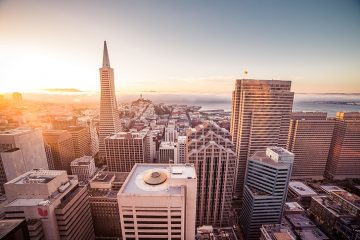The City That Was: The Ace in the Hole for Creative Culture
In The City That Was, Bohemian Archivist P Segal tells a weekly story of what you all missed: the days when artists, writers, musicians, and unemployed visionaries were playing hard in the city’s streets and paying the rent working part time.
This story—like all the rest I’ve told in this column—is about something in San Francisco that’s now gone. But unlike so many of the wonderful things about the arty old city, this is one that you can actually help preserve. I’ll tell you how shortly, but first I’ll tell you why you’d want to do it.
Once upon a time, in the city by the bay, a business could get a 25-year lease. That’s what Bill Kennedy, a third generation San Francisco junk man, did, for a big lot in Bayview—where both his brothers had junkyards on family owned land. Ace Auto Dismantlers began like most other places where dead cars and appliances were broken down for scrap and parts. And then the artists found him.
Groups like Survival Research Laboratories, by the late ’70s’s, were making machine art designed to rip the shit out of other machine art. (I have a vivid memory of SRL robots fighting to the death under a south of Market freeway really late one night.) Creations of that sort required lots of metal, and preferably nothing that anyone would miss. You wouldn’t melt down the family silver to make warring machine monsters. Junkyards were as good as gold to artists like that.
Other kinds of artists and makers also found Ace. The vehicle for Cacophony’s gun-happy Car Hunt came from there. The metal parts for so many of those great art cars you’ve seen at Burning Man came from there, and when they made their last trips to the playa, a lot of them ended up dismantled at Ace. Ashes to ashes, scrap metal to scrap metal.
Bill was fascinated with his new clientele and their projects. In fact, he’d found his people. He made countless projects possible, charging almost nothing (or nothing at all) for the materials to make great stuff happen. It was philanthropy at its most unassuming, direct, and literally hands-on.
Ace was conveniently situated in an industrial area, so it was one of those kinds of places where you could make plenty of noise. Surrounded by creative people always on the lookout for places to perform or stage events, Bill turned the junkyard into an entertainment venue. Bands and other performers played there, among the piles of rusting fenders, and one-of-a-kind events, like the Power Tool Drag Races, attracted big audiences and the Discovery Channel.
Over the years, a lot of people took footage of events at Ace. Among them was Yasmin Mawaz-Khan, known as Yasi Mak, whose sister is one of the founding Flaming Lotus Girls. When Yasi moved to the city in 2006, she was conscripted into that clever collective, and dragged along to Ace. She saw what it was, true patronage of the arts, and an anti-pretentious salon for the freaks, geeks, makers, and maker-breakers of the art world that made the city so curiously and creatively alive.
In 2009, Bill Kennedy’s seemingly endless 25-year lease was up. Because this is recent San Francisco history, you can imagine what happened. The landlord refused to renew his lease, and the possibility of finding another affordable big space in the city was beyond hopeless. Knowing that Ace would soon join the long list of amazing places that are gone forever, Yasi Mak redoubled her efforts to document it.
When she began the project, Yasi envisioned making a short film. As she investigated Ace’s history, other filmmakers provided hours and hours of imagery that captured decades of brilliant weirdness and a kind of altruism that is now so hard to find. In this wealth of extraordinary documentation, she knew she had a feature film.
What she didn’t have was the capital to make a feature film, so she launched a Kickstarter campaign. The campaign ends in six days, and it’s been unfortunately concurrent with all those pleading emails from candidates up against the Koch brothers’ mega-money. So if you haven’t spent your last available dollars trying to keep the tea party out of Congress, please send them to Yasi Mak. Here’s her Kickstarter page: https://www.kickstarter.com/projects/385694025/ace-in-the-hole-death-of-a-junkyard
I’m on a one-person campaign to restore the city’s arty underground, but I can’t bring back Ace. What we can do is help Yasi complete this project, evidence of the city that was, and in watching it, come close to being there.
The first photo of John Law‘s iconic Doggie Diner heads at Ace, and the last photo, of its arty signage, were both taken by Scott Beale of Laughing Squid. The photo of Bill was taken by Yasi Mak.





